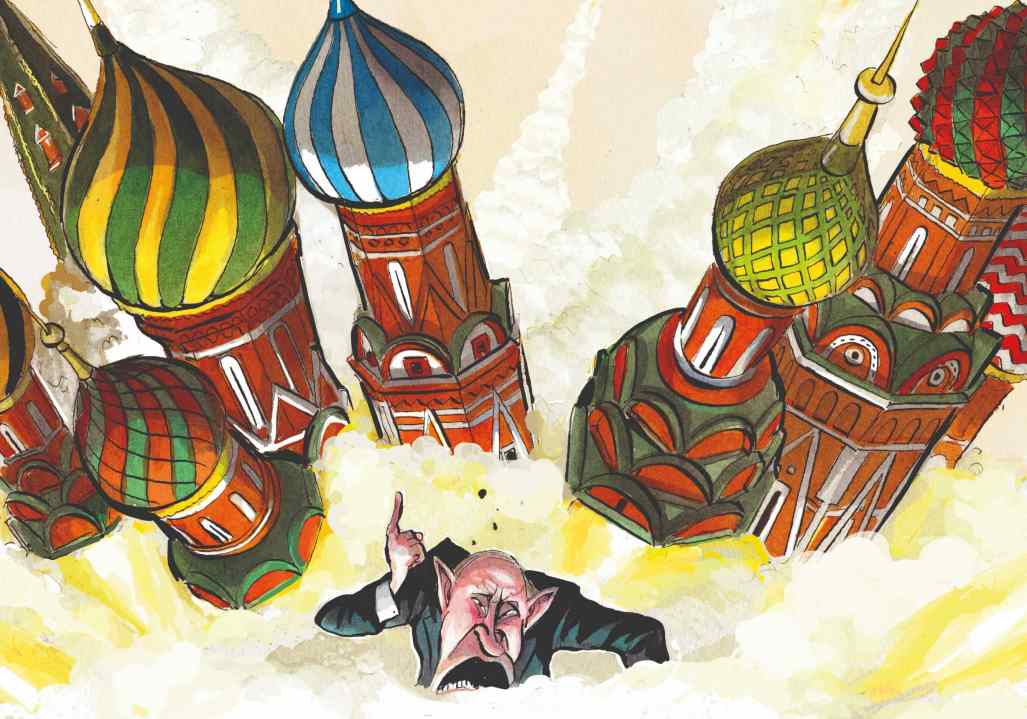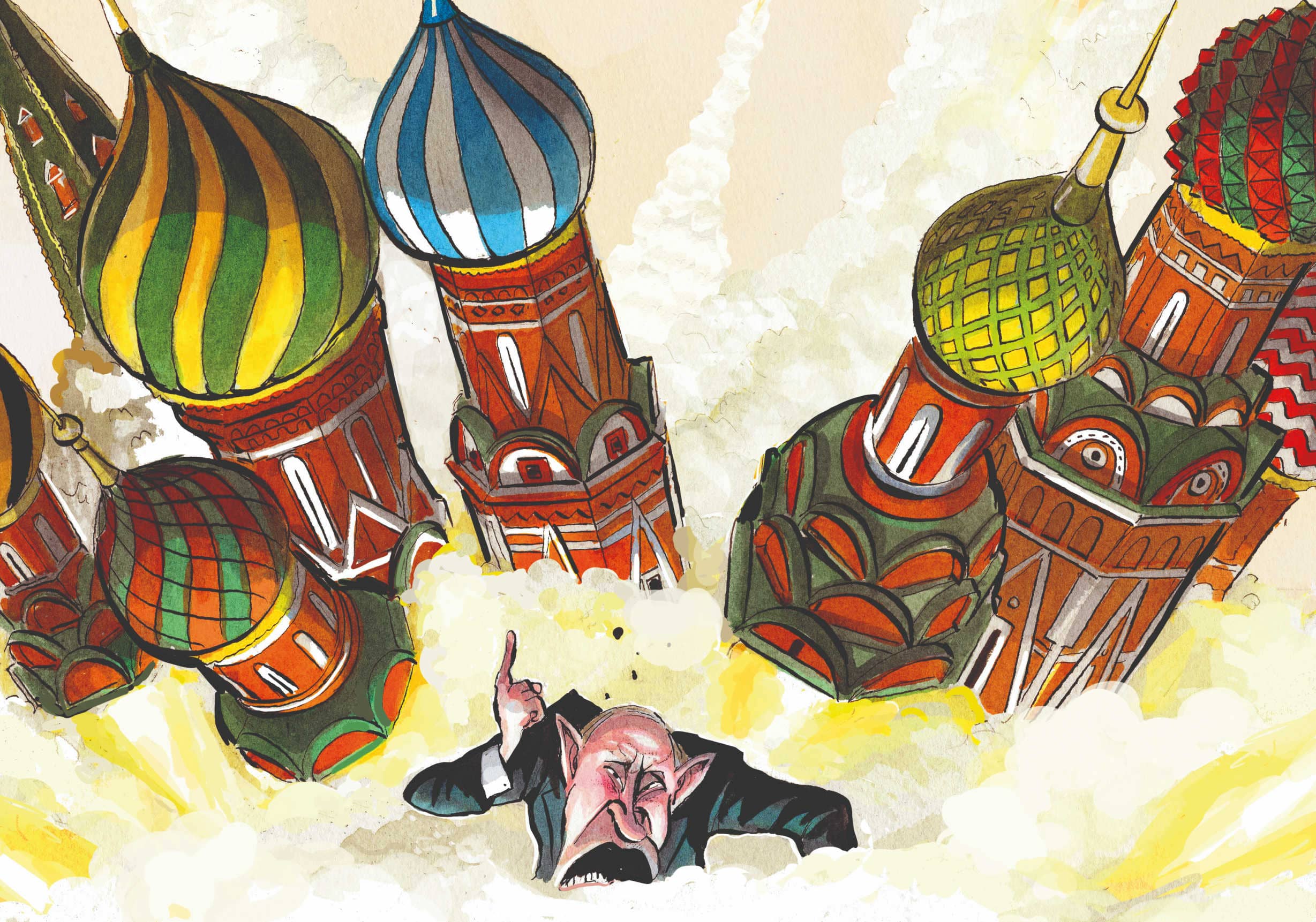The world is facing the prospect of its first nuclear attack since the US Air Force dropped atomic bombs on Hiroshima and Nagasaki in August 1945. Yet that horror arouses little fear or outrage. The possibility that a cornered Putin will use ‘tactical’ nuclear weapons to punish Ukraine for humiliating the Kremlin remains a nightmare most can live with.
Paranoia about nuclear conflict haunted the Cold War of the 20th century. Today our tolerance of the intolerable appears higher. The vast mass of people don’t care to think about it. Policy elites believe that no one who looks at Ukraine with seriousness and compassion believes that they have done all they can do to avert it.
And so we belittle threats that terrified our parents and grandparents. Anti-nuclear demonstrators do not disturb the crowds queuing to pay their respects to the late Queen. Fears of radiation clouds do not panic the European public. We comfort ourselves with talk of ‘tactical’ nuclear weapons that sound nasty, no doubt about it, but manageable.
Sensible generals say there is no such thing as ‘tactical’ nuclear weapons. There are just nuclear weapons. The Russian ‘tactical’ weapons that could hit Ukraine are ‘delivered’ by cruise missiles fired from submarines and ships, or from land-based missile launchers. (While we are on the subject of euphemisms, what a genteel understatement ‘delivered’ is. It makes weapons of mass destruction sound like pizzas.)
The bombs they carry have about 10 kilotons of destructive power. To grasp the devastation 10 kilotons can cause, the atom bomb dropped on Hiroshima had a yield of 15 kilotons. It killed about 70,000 people, injured another 70,000 and levelled the city for 12 square kilometres around the blast site.
We cannot rule out the chance that nuclear terror will return. Neither can we do much to stop it returning.
In our time, the explosion that destroyed much of central Beirut in 2020 was less than 1 kiloton. It still stripped steel-framed buildings of their cladding, and left 300,000 people homeless. There’s nothing tactful about tactical weapons.
A possibility is not a likelihood. To say that it is possible that Putin will order a strike is not the same thing as saying that he will probably do it.
The best analysts of the Ukraine war are convinced he is blustering. In an interview with the Economist this week, retired US general Wesley Clark explained that exploding one bomb would be militarily pointless. ‘Would the Ukrainians say “oh my goodness they’ve dropped a battlefield nuclear weapon on Izyum…OK let’s surrender”. No, they’re not going to surrender and Putin knows it.’
Politically, it would turn publics in the global south and parts of Europe that are currently indifferent to Russian imperialism against Putin. The Chinese Communist leadership, which this week was making its displeasure with Putin clear, would find itself bound to a state willing to upturn the taboos that govern warfare and drag it into its failing conflict.
Speaking to Ukrainian journalists this week, Lawrence Freedman, the great British authority on strategy, was equally sceptical. Putin would not dare run the risk that Nato would retaliate in kind, he said. How would he explain to the Russian people and elite that a war he does not even dare to call a war had gone nuclear?
Freedman and others point to red lines the Ukrainians have crossed without nuclear escalation. In the spring, for instance, it was commonplace to hear that an attack on Russia’s prized imperial possession of Crimea would trigger a nuclear response. ‘Now it’s being attacked, in a way that actually makes it very hard for Russia to work out how it’s being attacked, whether it’s some internal sabotage or some clever tricks the Ukrainians are using. And it doesn’t lead to escalation. So, what seems high risk when they start seems modest risk later on.’
I could go on. A ‘tactical’ bomb in Ukraine could kill, main, or poison Russian troops – not that their military or political leaders care overmuch about them. Radiation could spread over Ukraine’s border with Russia.
To add to this reassurance, those who worry about nuclear escalation must acknowledge that Nato governments and militaries have been worrying for them. Led by the Biden administration, western powers have been careful not to give the Ukrainian armed forces weapons that could threaten Russia. At a cost of thousands of civilian and military lives, Nato is keeping Ukraine on a leash and has done so since the start of the conflict. It will not let the Kremlin believe that it is facing an existential threat by giving Ukraine its most lethal weaponry.
Yet the room for doubt remains. Military analysts who believe we can escape a catastrophe must downplay Russian military doctrine and how it envisages the first use of nuclear weapons in conventional wars. They tell us to wipe from our mind, too, of the jeering bullies of Russian state television who deploy threats to go nuclear against Ukraine and the wider West as a matter of course.
Underlying their arguments is a belief in Putin’s rationality. General Clark says using nuclear weapons would be a totally irrational act: ‘And one thing we have seen about Putin is that he may make mistakes but he is not irrational’. Freedman agrees, ‘I don’t think Putin is impulsive; I think he just got the calculations wrong this time. He thought it was a limited military operation and it turned out it was not, and it dragged his country into a horrible war.’
The questions crowd in. Is a man who locked himself away during the pandemic rational? More pertinently does Putin see any rational difference between his interests and Russia’s interests? There’s no reason to think he does. The existential threat to his autocracy that defeat in Ukraine could bring surely appears to him to be an existential threat to Russia itself. The tsar cannot separate the two.
In these circumstances, we cannot rule out the chance that nuclear terror will return. Neither can we do much to stop it returning.
Betraying Ukraine is the only plausible way to remove the possibility of a catastrophe. If we cut off all weapons supplies and left it at Putin’s mercy, then the threat would recede. There is no way of eradicating the chance of a nuclear war because no major Western government can advocate appeasement on such a scale.
And so we live with the faint possibility of a European Hiroshima. The carefree do not think about it. The policy makers, who must think about it, believe there is nothing more they can do to avert it.








Comments